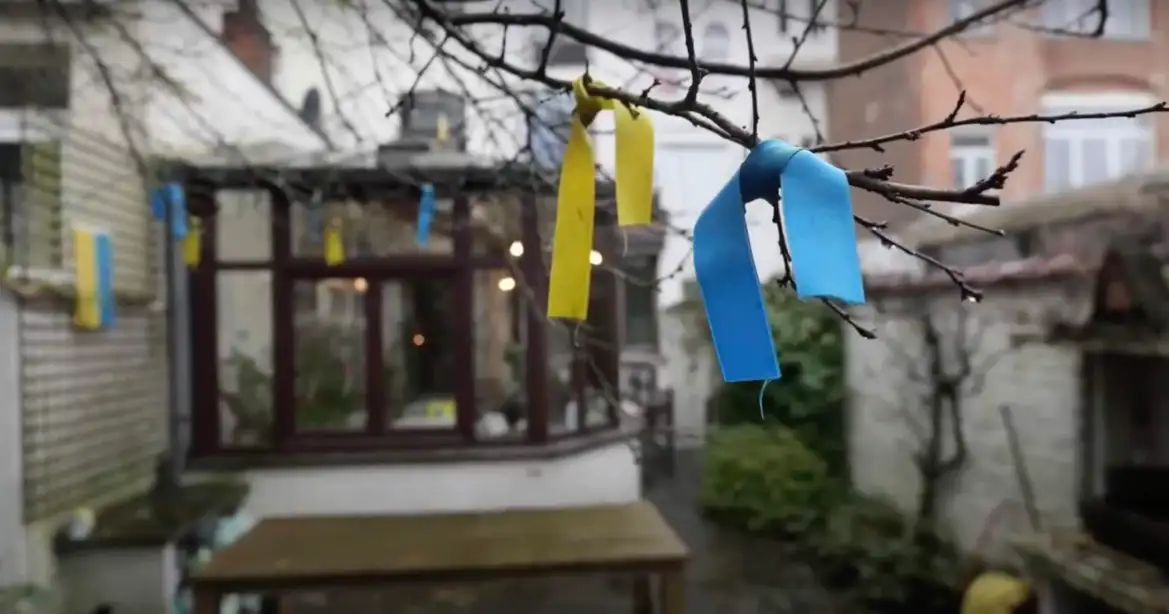Read the whole article by EUToday here.
We were invited to Maison du MédiaLab in late August for one of its monthly informal networking evenings, held at the Leclercq family residence in Etterbeek.
Thanks to fine late-summer weather, the reception took place in the garden. The house—now both a home and a working base—hosts rotating cohorts of journalists from Ukraine, Moldova and Georgia for six months at a time. The aim, as the founders describe it, is straightforward: increase the presence of Eastern European correspondents in Brussels and improve first-hand reporting of the EU and NATO for audiences back home.
The setting was deliberately unceremonious. Guests moved from the side passage into the garden where conversations began over plates rather than podiums. Christophe Leclercq, who founded Euractiv, welcomed visitors in person. He offered bowls of mirabelles picked from a tree on the property—a small detail that captured the evening’s tone: domestic, unhurried and closer to a family reception than to a formal press briefing. The residents had prepared national dishes for the occasion, with a marked emphasis on baked specialities, and the menu served as an icebreaker. The food was there to be eaten, but it also functioned as a map of the region’s traditions set down on a single table.
The journalists in residence—the second cohort—introduced themselves with short accounts of their beats and home newsrooms: Luminița Toma (Teleradio Moldova), Olha Kyrylova (Telegraf UA), Felicia Ganev (Ziarul de Gardă), Zaza Abashidze (Civil.ge/RealPolitika), Milana Holovan (Liga.net) and Luka Khachidze (TV Formula). Conversations moved quickly to the practicalities of Brussels reporting: accreditation, sourcing, institutional calendars, and the craft of translating complex files—enlargement, security assistance, sanctions—into clear copy for domestic audiences. Several described the challenge of covering EU processes without a permanent bureau and the difference that proximity makes when briefings, trilogues and late-evening press conferences are within reach.
Maison du MédiaLab’s model is designed to reduce barriers of entry. Residents receive free accommodation and a programme of coaching, introductions and newsroom visits. The organisers’ focus is on logistics and networks rather than editorial oversight: create the conditions for reporting to happen, and let the journalists’ home desks set the line. Funding is mixed. Housing is provided in kind by Christophe Leclercq and Sharon Leclercq-Spooner; operational costs—including stipends, training and events—are supported through a co-founders’ club and partnerships. The initiative sits alongside Stars4Media, an EU-supported innovation programme, but operates with its own budget and objectives.
What stood out during the evening was the frequency and variety of interactions. Beyond the monthly receptions, residents take part in weekly sessions—some skills-based, others focused on the policy calendar. The approach is to combine formal briefings with informal contact so that newcomers to Brussels can establish sources efficiently. We observed spontaneous peer-to-peer exchanges: tips on reading Council agendas, suggestions for navigating Commission midday briefings, and names to know in parliamentary committee secretariats. None of this is remarkable in isolation; taken together, it is the infrastructure that turns a visiting reporter into a functioning correspondent.
Discussions with the cohort circled back to the same point: reporting from Brussels is most effective when it is done in Brussels. For Ukrainian, Moldovan and Georgian outlets, this is not only a question of access but of accuracy. Accession-related files evolve through drafts and technical notes; NATO messaging often sits within broader allied consultations. Distance can encourage reliance on secondary sources; presence allows verification at source. The residents’ accounts underscored this distinction without rhetoric.
The house itself reinforces the programme’s ethos. It is a typical Brussels “maison de maître”, adapted only as much as necessary to host newsroom workstations and small gatherings. There are no logos on the walls or studio lights in the corners; it is still a home, and the absence of institutional trappings seems intentional. It lowers the threshold for conversation, and it reflects the organisers’ view that hospitality can be a practical tool in building a press corps.
During the evening we also spoke at length with Sharon Leclercq-Spooner about how the initiative began: a gradual evolution from hosting a single refugee journalist to designing a structured residency with training and networks. The personal commitment of the founders is evident in the practical choices—opening their home, organising regular meet-ups, and supporting residents’ access to institutions and contacts. It is a model built on proximity, time and consistency rather than branding. The dedication of Christophe and Sharon is notable in both scope and continuity.
The project’s targets are specific: to raise the number of Eastern European correspondents in Brussels over the next five years and to normalise a budget line for a Brussels presence within participating newsrooms; success, the organisers say, will be measured not by events hosted but by alumni holding accredited roles, filing regularly and sustaining desks after the six-month residency. Early outcomes point in that direction: one of the first residents, Tetyana Vysotska (European Pravda and Espreso TV), completed a six-month stint after which we noted a clear uplift in European Pravda’s Brussels coverage—more consistent use of Commission and Council documents, tighter integration of briefings and committee work, and several EU-focused exclusives drawn from parliamentary and diplomatic sources.
Our late-August visit offered a view of the programme at work rather than in prospect. The second cohort is in place; the calendar of workshops and meet-ups is active; and the house is doing what it was set up to do—providing time, space and access. The tone of the evening was friendly without being staged, and, before we left, we wished the participants every success in the months ahead. The informal hospitality—mirabelles from the garden and home-cooked dishes prepared by the residents—framed substantive conversations about the craft of reporting from Brussels. It was an evening that showed the residence functioning as intended: a practical bridge between Eastern European newsrooms and the EU capital.

